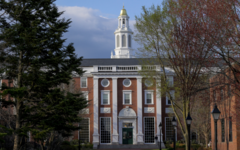Harvard University is escalating its battle against the Trump administration by filing a lawsuit over a funding freeze affecting billions intended for federal grants. President Alan M Garber communicated the university's concerns in a letter to the community, emphasizing that the cessation of approximately $2 billion would have dire consequences for essential research into diseases such as pediatric cancer and Alzheimer's.
The case arises after Harvard rejected various demands from the Trump administration aimed at regulating diversity initiatives and addressing anti-semitism at the institution. In response, the White House dismissed Harvard's call for reinstatement of funds as a "gravy train" coming to an end. The university, which receives about $9 billion in federal funding annually, argues that the move undermines academic decision-making and violates its constitutional rights.
In light of rising tensions, President Trump has previously targeted multiple elite universities' funding, claiming they foster anti-Jewish sentiment without protecting Jewish students. Harvard acknowledges issues with anti-semitism on its campus and has taken steps to address these concerns, but it rejected the idea of federal oversight over academic programs.
As the legal proceedings unfold, Harvard's standing in the face of federal scrutiny raises significant questions about the university's future and that of other institutions facing similar funding cuts. Harvard's tax-exempt status and enrollment of international students may also come under fire, further complicating the dispute. Meanwhile, public confidence in higher education continues to wane, with growing political scrutiny, especially from Republican circles, suggesting this battle is indicative of larger issues within American academia.
The case arises after Harvard rejected various demands from the Trump administration aimed at regulating diversity initiatives and addressing anti-semitism at the institution. In response, the White House dismissed Harvard's call for reinstatement of funds as a "gravy train" coming to an end. The university, which receives about $9 billion in federal funding annually, argues that the move undermines academic decision-making and violates its constitutional rights.
In light of rising tensions, President Trump has previously targeted multiple elite universities' funding, claiming they foster anti-Jewish sentiment without protecting Jewish students. Harvard acknowledges issues with anti-semitism on its campus and has taken steps to address these concerns, but it rejected the idea of federal oversight over academic programs.
As the legal proceedings unfold, Harvard's standing in the face of federal scrutiny raises significant questions about the university's future and that of other institutions facing similar funding cuts. Harvard's tax-exempt status and enrollment of international students may also come under fire, further complicating the dispute. Meanwhile, public confidence in higher education continues to wane, with growing political scrutiny, especially from Republican circles, suggesting this battle is indicative of larger issues within American academia.




















